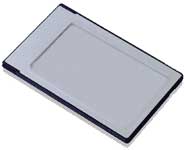PCMCIA Cards
The QSR supports three types of PCMCIA cards. Use Flash RAM cards to store your sample files, as well as Programs and Mixes that use these samples.
The QSR provides expansion capability through the two PCMCIA EXPANSION CARD slots on the front panel. The QSR was designed to accept three different kinds of Sound Cards. Of the three compatible types, the recommended card is the Flash RAM card, shown below, due to its low cost and high capacity.

| Card Type | Description | Status |
|---|---|---|
| SRAM | Provides an additional four banks of Program/Mix memory. All banks can be stored to by the user, and it comes with additional Programs and Mixes pre-stored. | 8M cards available for around $200. Smaller SRAM cards, 256kb and 512kb are affordable, and they can be used to store programs, mixes and full banks, straight from the QS, no SoundBridge or computer needed. |
| Q Card | These read-only memory cards provide actual samples, plus the Programs and Mixes that use them in a single card bank. Available QCards include a Stereo Grand Piano card, a Sanctuary card that includes high-quality voice, bell, and organ sounds, a World/Ethnic card, Rap/Techno/Dance cards, Vintage Keyboards, and many more. | Several Q Cards are available on the web, mostly for synthesizer sounds and programs. |
| Flash RAM | Flash RAM cards can be programmed with custom samples, programs and mixes using Sound Bridge software. | This is the recommended card type. 8M cards available for around $100. |
The QSR’s two PCMCIA expansion card slots can accommodate any combination of these three card types. The QSR Drum Synthesizer described here uses only the Flash RAM card type. By using Flash RAM cards in both slots, the QSR can hold up to 16 MB of sample and sysex data.